


Seconds Out, which came out in 1977, was the second live album Genesis released after Genesis Live in 1973. Much had happened in the meantime: The band created Selling England By The Pound and The Lamb Lies Down On Broadway, two studio albums that are highly regarded in the progressive rock scene, before Peter Gabriel announced in the spring of 1975 that he would be leaving. The remaining band members wrote material for another album without having found a new singer yet, which was why drummer Phil Collins finally stepped up to the microphone. A Trick Of The Tail and Wind And Wuthering in 1976 and 1977 were two very melodious and much appreciated albums by the four-piece lineup of Banks, Collins, Hackett and Rutherford. Seconds Out was final chapter in the comparatively short history of Genesis as a four-piece: It is the last Genesis record to involve Steve Hackett. He left the band before Seconds Out was completed in order to work on the solo career he had launched in 1975 with Voyage Of The Acolyte.
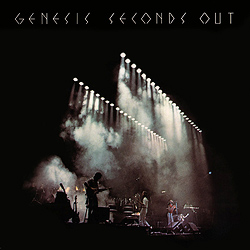 For many Genesis fans, Seconds Out is the last classic Genesis album before a turning-point hardly any other band has ever reached with such fundamental consequences. Peter Gabriel's costumes and bizarre fairy-tale stories became a thing of the past. Phil Collins had to adapt to the new role of frontman. He took care of the theatrical dimension in his own way by using differenct voices, mimics and gestures without trying to imitate Gabriel's way. The years of musical complexity were slowly but certainly coming to an end, even though there was nothing yet to indicate their later breakthrough as a mega-successful stadium band that would play mass-compatible pop rock songs.
For many Genesis fans, Seconds Out is the last classic Genesis album before a turning-point hardly any other band has ever reached with such fundamental consequences. Peter Gabriel's costumes and bizarre fairy-tale stories became a thing of the past. Phil Collins had to adapt to the new role of frontman. He took care of the theatrical dimension in his own way by using differenct voices, mimics and gestures without trying to imitate Gabriel's way. The years of musical complexity were slowly but certainly coming to an end, even though there was nothing yet to indicate their later breakthrough as a mega-successful stadium band that would play mass-compatible pop rock songs.
When Genesis had had their studio album remastered for their „small“ reunion (Banks, Collins, Rutherford) in 2007 the live albums, and Seconds Out with them, underwent the same rejuvenation process in 2009 (cf. the article on the live boxset). The ensuing debates about the pros and cons of thus primping the back catalogue as well as the changes in familiar and perhaps even preferred listening habits may cause the listener to reflect on what they regard as essential for the characteristics and the quality of the album. What is the role Seconds Out plays in the Genesis discography? What impression do the songs and their combination make on our ears 35 years after it had originally been released?
Let us, then, travel into the past by putting on Seconds Out again and following it with alert senses...…
Squonk
The beginning of the album is very familiar: We are inside a murmuring crowd. The atmosphere is that of, say, a station hall. No signs of concentration or curiosity, but there is a certain reserve in a crowd that seems to be looking forward to something. Through the ambience we hear Chester Thompson's drumsticks stealthily counting them in before the band begins suddenly and gets going in a labouring fashion like an old steam train: The unmistakable sounds of Squonk, a powerful, plodding beat, a simple but striking guitar riff, the thundering bass pedal and not least the flowing keyboard melody lead us into the show. The audience seems to need a moment to register the beginning of the show before there are a few cheers and applause.
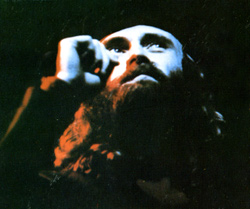 If we compare it with the studio version and Bill Bruford's interpretation on the Trick Of The Tail tour the year before we realise that Thompson's drumming gives a rougher edge to the songs – he plays the hi-hat semi-open in strongly accentuated crotchets and really bangs on the cymbals in the chorus. Still, Squonk does not quite fit in with those other grand opening gestures with which the band would capture their audience emotionally from the first moment: Neither does it have the thunderclap effect of Dance On A Volcano nor does it exude the mystical magic Watcher Of The Skies conveyed. They could have chosen Eleventh Earl Of Mar in 1977 which would have been a bombastic beginning of the show, but with Squonk as the opening song the recording will have come full circle for the listener when the central motive of Squonk reoccurs four record sides later in one of the most captivating concert finales in the whole realm of rock music. But we are not there yet – we let ourselves be led through the light-footed outro of Squonk by the tambourine play of Phil Collins (complete with whimsical smile, full beard and woolen cap) …
If we compare it with the studio version and Bill Bruford's interpretation on the Trick Of The Tail tour the year before we realise that Thompson's drumming gives a rougher edge to the songs – he plays the hi-hat semi-open in strongly accentuated crotchets and really bangs on the cymbals in the chorus. Still, Squonk does not quite fit in with those other grand opening gestures with which the band would capture their audience emotionally from the first moment: Neither does it have the thunderclap effect of Dance On A Volcano nor does it exude the mystical magic Watcher Of The Skies conveyed. They could have chosen Eleventh Earl Of Mar in 1977 which would have been a bombastic beginning of the show, but with Squonk as the opening song the recording will have come full circle for the listener when the central motive of Squonk reoccurs four record sides later in one of the most captivating concert finales in the whole realm of rock music. But we are not there yet – we let ourselves be led through the light-footed outro of Squonk by the tambourine play of Phil Collins (complete with whimsical smile, full beard and woolen cap) …
The Carpet Crawl
... until familiar keyboard chords creep in and caresses us with a cozy feeling. Carpet Crawlers, the ballad from the 1974 Lamb album, begins without the original interlude and, by virtue of the deeper sounds, creates a warm, mystical beginning. Collins sings the first two verses in a restrained, gentle manner. The whole band actually appears to be tip-toeing around as if they did not want to interrupt the audience doing whatever the audience does. We, however, soak up the magic of the moment and feel the band getting looser in the chorus – the drums come in gently and in the new mix we get a better impression of Steve Hackett's extremely soulful guitar play.
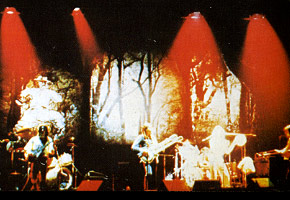 Collins gets going, too – he appears not to have any trouble with the high notes in the chorus. The second verse takes us back to the mood of the beginning of the song before Tony Banks and Mike Rutherford join Phil in singing the second chorus and leading towards the finale. In the third verse they really pull out all the stops. The sound becomes fuller yet, drums and guitars move to the fore and Collins sings fully at ease. Though he strays from Gabriel's original vocal line he still appears to be as lively and authentic a narrator as his predecessor. The magic of Seconds Out has captivated us, if not before, then certainly by the final verse and the outro that follows, when the band ease back again to very delicately sing the polyphonous chorus once more before letting it slowly ebb away.
Collins gets going, too – he appears not to have any trouble with the high notes in the chorus. The second verse takes us back to the mood of the beginning of the song before Tony Banks and Mike Rutherford join Phil in singing the second chorus and leading towards the finale. In the third verse they really pull out all the stops. The sound becomes fuller yet, drums and guitars move to the fore and Collins sings fully at ease. Though he strays from Gabriel's original vocal line he still appears to be as lively and authentic a narrator as his predecessor. The magic of Seconds Out has captivated us, if not before, then certainly by the final verse and the outro that follows, when the band ease back again to very delicately sing the polyphonous chorus once more before letting it slowly ebb away.
Robbery, Assault & Battery
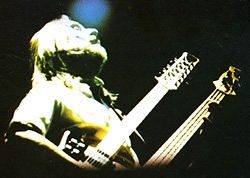 Robbery, Assault & Battery introduces a lighter note. The straightforward humour of this penny dreadful on the Trick album is not just a more or less amusing intermezzo. It also shows the band playing with a light-footed, lively groove, modest but pleasantly intricate guitar work by Hackett, an excellent rhythm group and a first instrumental highlight in the middle part. Delicate live sound (the pleasure of these tasteful keyboard sounds can almost be felt bodily) and the playfulness of the song provide the perfect change of moods after a strong Squonk and the sensitive Carpet Crawlers. The song may not be the most remarkable composition, apart from the middle part with its rhythmically and melodically attractive keyboard solo, but it grows with Phil's lively performance of Harry The Criminal. We can almost see him before us in Harry's filthy gangster coat looking puzzled when he is caught in the act. Collins' wild tambourine playing and the loose singing in the outro are also entertaining.
Robbery, Assault & Battery introduces a lighter note. The straightforward humour of this penny dreadful on the Trick album is not just a more or less amusing intermezzo. It also shows the band playing with a light-footed, lively groove, modest but pleasantly intricate guitar work by Hackett, an excellent rhythm group and a first instrumental highlight in the middle part. Delicate live sound (the pleasure of these tasteful keyboard sounds can almost be felt bodily) and the playfulness of the song provide the perfect change of moods after a strong Squonk and the sensitive Carpet Crawlers. The song may not be the most remarkable composition, apart from the middle part with its rhythmically and melodically attractive keyboard solo, but it grows with Phil's lively performance of Harry The Criminal. We can almost see him before us in Harry's filthy gangster coat looking puzzled when he is caught in the act. Collins' wild tambourine playing and the loose singing in the outro are also entertaining.
Afterglow
There is a mood swing between Squonk and Carpet Crawlers, and there is a similar contrast between the closing part of Robbery, Assault & Battery and the elegiac Afterglow that follows it. Unlike the rather colourless studio version or later, rawer live versions, the 1977 version of Afterglow, which was „pretty much Tony's baby“ according to Mike Rutherford, has deeply moving dynamics. The ballad begins in an aloof, ethereal manner that seems much more reduced than we know from the Wind And Wuthering album. While the album version tends to appear bloated, over-produced and sugary with its doubled drum tracks and different vocals, this live version is refreshingly honest.
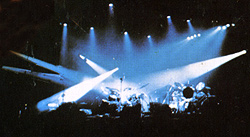 Chester Thompson plays gentle accents on the ride cymbals that make the song a bit more light-footed. The song gains body from Rutherford's sustained bass pedal sounds in the beginning, Banks' epic choir sounds later and Collins' supreme vocals. Though this song is from the beginning of his career as a singer, he never sang it with more feeling than here. The first two verses in particular, which deal with deepest desperation and the admission of having failed („but now, now I've lost everything ... I give to you my soul - the meaning of all that I believed before … escapes me … in this world of none...“) are sung so touchingly in his thin and then still fragile voice that his rendition brings out all the simple beauty of Banks' lyrics. What is really impressive about Collins' vocals here is the fact that not only does he express the resigned moments in the lyrics, but turns it into the deep yearning and uncompromising determination he shows in the final verse („and I would search everywhere … just to hear … your call...“). This is a most impressive way to convey the change in the lyrical I.
Chester Thompson plays gentle accents on the ride cymbals that make the song a bit more light-footed. The song gains body from Rutherford's sustained bass pedal sounds in the beginning, Banks' epic choir sounds later and Collins' supreme vocals. Though this song is from the beginning of his career as a singer, he never sang it with more feeling than here. The first two verses in particular, which deal with deepest desperation and the admission of having failed („but now, now I've lost everything ... I give to you my soul - the meaning of all that I believed before … escapes me … in this world of none...“) are sung so touchingly in his thin and then still fragile voice that his rendition brings out all the simple beauty of Banks' lyrics. What is really impressive about Collins' vocals here is the fact that not only does he express the resigned moments in the lyrics, but turns it into the deep yearning and uncompromising determination he shows in the final verse („and I would search everywhere … just to hear … your call...“). This is a most impressive way to convey the change in the lyrical I.
Afterglow unfolds its strength only in the combination of lyrics and music. The version on Seconds Out embodies that sublime moment when singer and instrumentalist enter the perfect symbiosis. Listening to this version of Afterglow we are won over at the latest when Collins sings „... no thing, no one“ and the band moves towards the final verse in a breathtaking growth of dynamism – you can almost hear the musicians take a run up to really bring the highly emotional finale across... „and I would search everywhere...“ … we see a wide shot of the stage in a dark venue, with pink fog rising up behind the two drumkits, fog that is cut through „... just to hear … your call“ by the searing light from sixty-four jumbo jet landing lights... the mellotron choirs move even more to the front, Chester Thompson's cymbals sound even more transparent and Phil Collins sings with everything he has got... „... for now I've lost everything...“ - The band has vanished completely in the blinding cloud of fog while Collins runs to his drumkit after a final long „I miss you more!“ to crown the Genesis romantic bombast with a second finale. The stunning power of two drumkits seems sublime in their combination of warm tom-tom sounds and subtle light cymbals. The perfect synchronicity of Chester Thompson and Phil Collins, the dynamism which grows to an excess, to the legendary „Zappa fill“ Thompson brought with him, they all make the Afterglow outro the first big instrumental moment with both drummers on Seconds Out and finish off the first side of the album with a very grand gesture.
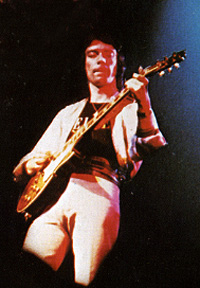 Firth Of Fifth
Firth Of Fifth
The second vinyl side of Seconds Out has a beginning similar to the first: Firth Of Fifth, a huge classic from Selling England By The Pound (1973) begins with a big bang. The only thing regrettable is that Tony Banks has done away with the piano intro, thus taking away from the formal cohesion of the song. Off we go with an abrupt drumbeat and here we are in the middle of one of the most representative Genesis songs from the 70s. This version embodies the exemplary, classical style of Seconds Out: When Collins sings his simple „a waterfall...“, accompanied only by a touch of cymbals and ethereal synth strings, an immensely attractive purity of sound aesthetics and poetry unfolds before our ears.
Firth Of Fifth is a good example for the unique sound in Seconds Out. It benefits more than any other song from the opportunity of having two drummers play the instrumental parts. When you compare it to the live version of Firth Of Fifth from the Selling England tour, it becomes apparent that, despite all flourishes and panache, the drum sound was thinner and had less depth. The Seconds Out sound on the other hand is much warmer, much fuller, because the different sound of both drum kits with their different cymbals combines in their synchronicity. The beginning of the middle section is much improved by the possibility to have both the drums (Thompson) and the percussion (Collins: tambourine) played live. It gains musical depth and expression. Steve Hackett's guitar solo, probably -the- solo in the progressive genre, is even more intense while Collins and Thompson harmonize so well in the background.... We listen raptly to subtle hi-hats, cowbells and various crash cymbals from both sides and the powerful parallel fills that come from both left and right and add to the drama of Hackett's wonderful solo. Towards the end Hackett makes his guitar scream a last time before a brute drum break leads into the slightly sluggish finale that ends with a conciliatory keyboard line. Before the audience gets the opportunity to fully express their appreciation...
I Know What I Like (In Your Wardrobe)
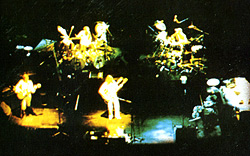 ...we hear a kind of jam session by the rhythm section. Genesis would usually play their songs as in the studio version. I Know What I Like is the exception to the rule, though. The single from the Selling England album has not only been adorned with this introduction, its live performances also benefit from the extended closing section. And that part is something special so that even those who do not quite like I Know What I Like enjoy it. The finale features Phil Collins' tambourine tarantella, of course, which is not as spectacular in an audio recording than on video. If you would like to get an impression of this artistic feat you will want to check out the 1976 film In Concert that can be found on the bonus DVD of the 2007 rerelease of A Trick Of The Tail.
...we hear a kind of jam session by the rhythm section. Genesis would usually play their songs as in the studio version. I Know What I Like is the exception to the rule, though. The single from the Selling England album has not only been adorned with this introduction, its live performances also benefit from the extended closing section. And that part is something special so that even those who do not quite like I Know What I Like enjoy it. The finale features Phil Collins' tambourine tarantella, of course, which is not as spectacular in an audio recording than on video. If you would like to get an impression of this artistic feat you will want to check out the 1976 film In Concert that can be found on the bonus DVD of the 2007 rerelease of A Trick Of The Tail.
For all those who get bored with the tambourine dance Genesis bring on a series of gimmicks that still make the live version interesting. We can clearly hear on Seconds Out how Phil hurries to his drum kit after the dance to play a groovy second beat on cowbell and tomtoms. If that is not for you you could try and find out which melodies of previous Genesis songs the band has hidden in the closing section. Apart from the most famous and most obvious quotation – the ending of Stagnation from 1970's Trespass – one can make out the beginning of Visions Of Angels (also from Trespass) and a bit of Dancing With The Moonlit Knight from Selling England... Some fans also feel that Mike's bass playing quote Blood On The Rooftops (Wind & Wuthering), a song Genesis unfortunately never played live.
When combined with Phil's quip 'I Love Paris In The Springtime' this is the document of a lovingly made live version. It may not be a substantial highlight on Seconds Out, but there is a particularly intense reaction from the audience at the end. Collins calls out „Merci, Paris!“, the crowd cheers out loud and we wonder how such an atmosphere could be outdone...
The Lamb Lies Down On Broadway / The Musical Box (Closing Section)
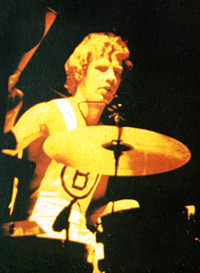 Genesis leave their audience no time to calm down from this high. Mysterious keyboard sounds creep into the applause. It takes the audience a moment to identify the chords, but when they do a new wave of enthusiasm hits us and washes us up Broadway.
Genesis leave their audience no time to calm down from this high. Mysterious keyboard sounds creep into the applause. It takes the audience a moment to identify the chords, but when they do a new wave of enthusiasm hits us and washes us up Broadway.
Let us say right away that The Lamb Lies Down On Broadway is very different on its own than in the context of the concept album of 1974. On the Wind & Wuthering tour it was no fiery opening song but an encore combined with the closing section of The Musical Box. In the dramatic arrangement of Seconds Out it is, as it were, the encore before the break. This is Genesis playing an all-out version of the Lamb album title song. While it only had gently cymbals and drum rolls on the Lamb tour, it gets the big treatment with open hi-hat, distorted guitars and big bass riffs. Collins also removes the theatricality of the chorus by offering a free interpretation („And the lamb … yes the lamb! … lies down … down, down, down! - on Broooo-adwaaaay!“). Opposed to this are only the pathetic backing vocals Banks and Rutherford add to the chorus, and a brief middle section that anticipated Carpet Crawlers. This is where the surreal mood of the original flashes through before the band comes in again. A strong cue where there was just a subtle drum roll in the original comes with strong hi-hat and playful guitar notes that soon evolve to the liveliness of the beginning.
While they heat up the atmosphere with The Lamb Lies Down On Broadway the brilliant transition to the closing section of The Musical Box (from Nursery Cryme, 1971) is another great live moment. The mood in the audience changes immediately when Steve Hackett begins to play the tune of The Musical Box. They had been clapping along merrily before, now they stop right away and there are appreciative whistles from those who know what is coming … „She's a lady, she's got time...“ Nostalgia spreads. Chester Thompson gently touches the chimes while we imagine how Collins replaces Gabriel's Old Man mask with his own facial expressions.
Finally the drums come in and the chords from guitars and keyboards keep heightening... Rutherford's bass pedal comes in and adds substance to the sound … until Collins sings the temptation coming from the musical box just like Gabriel used to: „Why don't you touch me?! Touch me! Why don't you touch me?! Touch me! Touch me now, now, now, now, now!” The instrumental finale for which Collins sits down at the drums, too, is another celebration off the occasionally odd bombast rock Genesis perform here. The audience are completely contented, as the big applause and the calls for „encore! Encore! Encore!“ prove. The show would have been over for the audience at this point, but Seconds Out still has lots to offer as we change to the second disc...
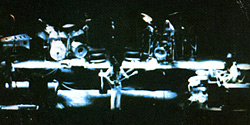 Supper's Ready
Supper's Ready
The second half of Seconds Out begins much like the first. We hear a wave of excitement ripple through the applauding crowd as Phil Collins simply states „Supper's Ready“. It is quite fitting that Supper's Ready is the only song on Seconds Out to have a brief announcement. Not only is it the opus magnum of the band and took the whole of side three at more than 20 minutes playtime, but it also is, in a way, the myth of the Gabriel era. The song is a surreal and mystical tour de force. All compository aspects the early Genesis used to express themselves are brought to bear on it, just like all the lyrical and theatrical elements that are usually linked to the artist Peter Gabriel.
Supper's Ready is a focal point for the self-conception of early Genesis fans. Collins, who would later complain that some of these fans made Genesis into a sort of holy cow, had little to gain from this song on the 1976 and 1977 tours. Perhaps we can use the distance of 35 years to properly appreciate Collins' work in this song.
Right at the beginning of the epic the line „walking across the sitting room“ immerses us in a very harmonic soundscape with guitars and cozy bass pedal complete with Collins' warm vocals.
The first part of Supper's Ready, Lover's Leap, is a gentle mise-en-scene. The focus seems to be on the mundane but also romantic situation of a married couple having supper. Lover's Leap is accordingly quite mellow and balladesque. Collins' gentler voice makes the sweet chorus almost more authentic than Gabriel. His „backing vocals“ during the instrumental passages underline the peaceful mood.
The mood dissolves, however, in The Guaranteed Eternal Sanctuary Man, the second part. It is remarkable how easily Collins switches from chest-voice to head-voice, thus not only bringing out the various characters but also the different moods in this part of Supper's Ready.
Whoever is fighting whoever in Ikhnaton And Itsacon, the musical rendition of the lyrics really works. One can feel the initial euphoria of the warriors who can hardly wait to go to (holy?) war. The band plays up with a big dynamic range, most so during the 'battle'. Banks' lively keyboard lines rule the image. Chester Thompson, who was playing his first tour with Genesis then, excels by mastering Supper's Ready easily despite the numerous changes in beat and rhythm.
Collins sings the unspectacular next part, How Dare I Be So Beautiful? in a thin, tragedic way – Willow Farm, as an extreme contrast, seems like a weird drug trip into a peculiar strange world. The brisk beat, Hackett's exalted guitar work and the vocal performance of Phil Collins, who uses everything his voice can offer and who audibly enjoys the absurd puns in Gabriel's lyrics, make this song really exciting. The final third of Supper's Ready is generally considered its strongest part. The Apocalypse In 9/8 with its weir instrumental is the dramatic climax, though it begins so peaceful: Long organ chords and guitar sounds slowly prepare for the end of the world....
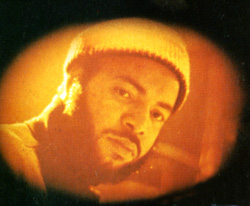 …like the calm before the storm a keyboard melody (originally played by Gabriel on the flute) begins to presage doom before the fury breaks out after a military drum beat: „With the guards of Magooooog / swarming aroooouund...““ Collins hold the notes out long and sings them in a most intense way – and brings us listeners into the right mood for the apocalypse. While Gabriel tended to become an actor in the scene he told by grotesque acting and his artificially brief singing, Collins is more tangible for the audience because he acts less. The central role besides the two drummers is taken up Tony Banks. His flowing organ chords illustrate the topic in a breathtaking manner.
…like the calm before the storm a keyboard melody (originally played by Gabriel on the flute) begins to presage doom before the fury breaks out after a military drum beat: „With the guards of Magooooog / swarming aroooouund...““ Collins hold the notes out long and sings them in a most intense way – and brings us listeners into the right mood for the apocalypse. While Gabriel tended to become an actor in the scene he told by grotesque acting and his artificially brief singing, Collins is more tangible for the audience because he acts less. The central role besides the two drummers is taken up Tony Banks. His flowing organ chords illustrate the topic in a breathtaking manner.
Apocalypse in 9/8 is, in fact, a gripping, a moving piece of music. Regardless of whether they like it or not, listeners have an special reaction to it. The intense chord runs that seem to beg for the release of a climax and the bombastic sound of two drummers hammering out a 9/8 beat lend this piece a uniquely threatening atmosphere. Nowhere else on Seconds Out can both drums be distinguished as clearly as here. All the subtleties, even the ghost notes on the snaredrums, are wonderfully clear and add a remarkable groove to this primeval force.
We are thrilled to hear Collins and Thompson as they seems to exchange slight rolls and fill-ins in an almost playful way. The tension rises again in the brief interlude where the band eases off a bit and there is only a stomping beat before Collins and Thompson come in again with china cymbals to add tragedy until all the energy that has been pent up for over 20 minutes is released in a thundering „6 – 6 – 6 / is no looonger alooone...“ We imagine Phil Collins standing on a platform behind his drumkit, singing with an intensity as if it really were a matter of life or death... „and the seven trumpet blooowing / sweet rock and rooooll / gonna blow right down inside your sooooul..“ In the long notes he overlays with his own echo, which only increases the effect. Wildly gesticulating he drives his voice to the limit, but still seems august and invulnerable. While we are still hearing his „brand new tuuuuneeee“ the band slows down a bit and uses recurring tomtom fills to move on to the last part of Supper's Ready …
And to make it come full circle, Genesis reprise the first part, Lover's Leap. Everything has turned to good again, the trip through hell is over and the lovers are reunited: „I've been so far from here, / far from your loving arms / Now I'm back again, and babe it's gonna work out fine.“ The impressive musical effect was enhanced by an optical effect in 1976 and 1977. Not only does Collins sing about an „angel standing in the sun“, his stage outfit also took on a rather lofty shape. Wearing a white gown and a full beard the resemblance to the conventional presentation of Jesus is not likely to have been a coincidence. As Sure As Eggs Is Eggs is a most impressive finale to Supper's Ready, and it is even better and much stronger than in the studio. Collins holds on to the last note, the „New Jerusulem“ as long as he can, vanishes in a laser cone, and the band protracts the closing section until their opus magnum ends with a fine guitar solo by Steve Hackett.
Those who have followed the song with ears uncluttered by ideology easily recognize the strength and the focus of Collins' interpretation: The theatrical effect manifests in the singer's performance. Collins uses his voice to perform many different roles in order to live up to the occasionally very abrasive contrasts as well as subtle nuances in the seven parts that open up like a whole new world. His ability is all the more impressive when you consider that Steve Hackett uses no less than five different singers (including himself) to cope with this piece in the new recording of Supper's Ready for his album Genesis Revisited II. Collins may well have benefited from his early acting career. It is, however, very clear that he makes excellent use of his voice. The souvereign use of register and colour in his voice is the foundation for a convincing, lively rendition. Genesis manage to perform this big epic of the Gabriel era with Phil Collins as the lead singer not just adequately, but in an impressive, captivating version on stage..
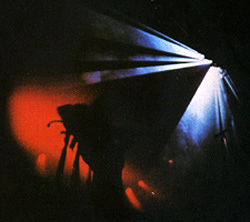 Cinema Show
Cinema Show
Gentle, soft guitar sounds introduce the final part of the album. „Home from work our Juliet...“ Collins adapts to the romantic guitar with a soft timbre and leads us into the slightly peculiar montage of Greek mythology and a 20th century's Romeo And Juliet. In a sweet voice he reports Juliet's preparations for the date before he conveys Romeo's expectations from the evening with a stronger, more expressive voice: „I will make my bed / with her tonight, he cries - / can he fail armed with his chocolate surprise?“ As in Firth Of Fifth, singer and band blend completely, casting a poetic and highly aesthetic mood. Collins' voice is much better suited to the falsetto part than Gabriel's, and the subtle percussion in the background makes us almost voyeurs to the action. Youthful ease and butterflies in one's stomach are conveyed by Bill Bruford's cue as he supports the beat with subtle press rolls and provides a backdrop of gargling percussion and bird whistles for the interlude. As in Lover's Leap all this creates a peaceful, unobtrusive but exciting effect that gently resolves with „Na-na-na-naaa... Na-na-na-na-naaaa.... Na-na-na-naa-na-na-naaaa-naaaa....“ Collins begins very softly, his band mates join in one by one until there is a brief moment of polyphony that leads back into the verse of „take a little trip back...“
This is actually a trip even further back: Cinema Show has a special place on Seconds Out for the recording is from the tour before that. Luckily, one is tempted to say, because it has Bill Bruford's free and variable rhythm work. He uses all kinds of percussion instruments and definitely leaves his stamp on the rhythms and colours of sound. The band would later find a drummer in Chester Thompson who better fit to their idea of musical predictability. Whatever one may think about the new accents added by Bruford, his drumming with Collins in the long instrumental part has a splendid groove and sounds highly inspired. If you compare this live version to the studio recording of 1973 you might think there were two utterly different temperaments. The Seconds Out version of The Cinema Show has become a benchmark, not least because of two drummers unleashed.
Actually it is not the drums that are frontmost in the instrumental second half of The Cinema Show. Initially, Tony Bank's intense keyboard part in 7/8 is the central element; only Collins plays the drums while Bruford adds just a bit of percussion here and there. When Bruford sits down at the drumkit we get to head two brilliant drummers playing together (and sounding very well against Rutherford's bass). Towards the end there even is a brief drum battle. Collins and Bruford goad each other on, the (china) cymbals get no rest at all, and both keep up the driving beat in perfect synch until the band joins in again and moves towards the big finale.
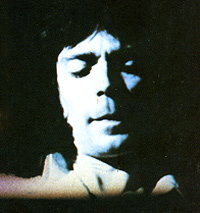 Dance On A Volcano
Dance On A Volcano
After the sparkling keyboard tune the entry motive of Dance On A Volcano marks a dramatic contrast. The raw power of the beginning may convey itself more directly on the Trick Of The Tail album, but it is less awkward here. The 1977 live version is more organic and befitting to the poetic vein of Seconds Out.
Cymbal rolls and clever breaks sound much warmer and less sterile here, and then there is the threatening bass to illustrate the omnipresent danger from the volcano we are climbing with the band. Thompson's hi-hats work very well in their hurried state. Only Collins seems a bit meek. He sticks to the studio version and sings far less aggressive than on later tours. The middle section is quite a feat; Collins breaks out the tambourine while Hackett and Banks swap unusual sounds to imitate bubbling and boiling lava. Thompson plays a bit gentler while Collins gets the audience to clap along to the beat before the whole band gets going towards the finale. There is a markedly richer, stronger sound before Collins sits down at the drums again and the band leaves the musical stage to the two drummers. On Seconds Out we get to heat the first drum duet with Phil Collins and Chester Thompson; it would become a fixture in all tours to follow. Here we only get to hear a tomtom duet for a couple of bars that nevertheless has the audience thrilled. Unfortunately the dance on the volcano proper, this completely unleashed and musically raw instrumental from the studio version with the crescendo and decrescendo in the epilogue, had to give way to the drum duet. Dance On A Volcano fits better into the climactic ending structure of the album, because it uses one of the main motives as a reprise as well as a move forward. The drum duet is in full flow...
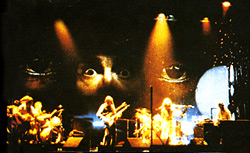 Los Endos
Los Endos
After a couple of introductory cymbal beats Collins and Thompson begin the transition into one of the most effective concert finales ever – Los Endos.
It seems peculiar that it should be an instrumental that brings the long journey to musical bliss to its peak and ending. The rising melody of the first notes lifts the song to higher spheres. Like fireworks the music rises, defying gravity, spirals upwards and blossoms into a majestic fiery rain that illuminates the skies.
The middle section is one of the truly great Genesis moments: We imagine the band dimly lit by vertical spotlights... fog wafts in … we hear a variation of the Dance On A Volcano intro that seems even more weighty because of the long, bombastic mellotron sounds … After a final volcanic drum thunder Collins and Thompson begin the final drum roll that grows more and more threatening... Relentlessly and accompanied by Hackett's guitar they drum out the 7/4 beat... we seem to be participating in a ritual without knowing where it takes us … While the audience clap along, Banks sneaks in a final reprise of the Dance On A Volcano melody … until the pent-up energy breaks out in an explosion and Squonk gives us the musical climax the band have been denying us for four minutes in full force...
The dramatic concept of the album comes full circle, the beginning and the ending, Squonk and Los Endos, correspond. It all does not only provide coherence but an almost spiritual audio experience.
Because of its excellent live suitability Los Endos became a staple of Genesis live shows. What we hear on Seconds Out may well be the classic version of a live classic. It may not be urging forward as youthfully as on the Trick tour (compare the In Concert film from 1976), but all tempi, transitions and musical colours are perfectly fine.
Let us also not forget this: It is the last time we hear Steve Hackett on a regular Genesis release, and it is far from nostalgia if we note that the way he had of colouring a song with his guitar instead of throwing in virtuoso riffs works strongly in Los Endos and leaves an indelible and inimitable mark on the song.
The sound of Seconds Out: Bombast and poetry
The sound of Seconds Out conveys a remarkable sense of space; it is ethereal in the quieter moments. The original mix was frequently criticised because Hackett's guitar parts did not come out and Collins' voice was rather in the background which helped neither the audibility of the lyrics nor the emotional presence of the vocals. To this day there is a legend that the band „mixed“ Hackett „out of the production“ of Seconds Out when they found out he was leaving. It has to be said, though, that the guitar sounds he used to use then are frequently very difficult to distinguish from Banks' keyboard sounds.
Banks' equipment of that time exudes lively brilliance and warmth. His characteristic sounds are worlds apart from the sterile presets he would use later. Rutherford's bass, too, is pleasantly strong without being overpowering..
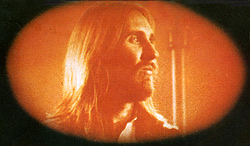 The drums sound transparent and intricate, which is very important for the moments when both drumkits are played simultaneously, and still down to earth. It is quite remarkable how well the listener can distinguish the drum kits by the differences in material and sizes of drums and cymbals. Thanks to the good stereo mix it is easy to locate the positions of the drum sets, particularly in the instrumental passages where the both play.
The drums sound transparent and intricate, which is very important for the moments when both drumkits are played simultaneously, and still down to earth. It is quite remarkable how well the listener can distinguish the drum kits by the differences in material and sizes of drums and cymbals. Thanks to the good stereo mix it is easy to locate the positions of the drum sets, particularly in the instrumental passages where the both play.
The album has, all in all, a tasteful rather than an overpowering overall sound, so Seconds Out can unfold the poetic strength that was so crucial in the band's songwriting at the time. The etherial beginning of The Cinema Show as well as the lyrical parts of Firth Of Fifth and Supper's Ready are good examples for this. Collins' singing hovers above it all and adds a poetic quality to the sound, as does Hackett with his guitar. A power guitar player is certainly something he was not in 1977.
Besides, he has some unusual effect settings that add a sawing quality – if he were just a bit too loud in the mix, his littlee touches would soon become annoying.
The huge dynamic highlights on the album unfold an impressive effect. At the end of each of the four original sides of the LPs Genesis celebrate the 70s bombast. What is pleasant about it is that the mix always is tasteful. There is nothing overdone or exagggerated, the music retains its poetic quality throughout. Seconds Out embodies pure poetry in its sound and its composition – and since this is true throughout the album the record develops its own identity as a unique work of art..
The 2009 stereo remix
The stereo remix Nick Davis created in 2009 for the Genesis Live boxset is quite different from previous releases. It removes one central flaw: The breaks between the songs on the original release have been removed so the applause can be heard throughout. The audience can be heard more clearly which adds to the „I am really there“ impression. When the concert begins you can clearly hear the excited applause and whistles so you hear Chester Thompson counting in only two of the four beats before Squonk begins.
I Know What I Like sounds much fresher and dynamic because you can hear the audience during the song as they react to his tambourine tarantella. After the triumphant Los Endos the first bars of the musical hit There's No Business Like Show Business have been removed so that the rhythmic chants from the audience mark the ending of the album. The transition from The Lamb Lies Down On Broadway to the closing section of The Musical Box becomes all the more effective with the appreciative whistles from the audience in the transition.
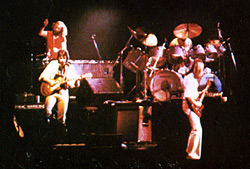 But it is not only the audience that can be heard better, some of the musicians come in more clearly, too. Nick Davis has moved Phil Collins' vocals to the foreground so that we hear subtleties in his expression we could not hear as clearly before. The first half of Supper's Ready benefits enormously from this as the theatrical rendition of the lyrics become more obvious. The old criticism about the old mix, viz. Steve Hackett was not audible, is also addressed: Hackett's guitar playing is louder and Banks' keyboards are not quite as overbearing, which makes Afterglow and Carpet Crawlers in particular more enjoyable. Before, one could hardly distinguish guitars and keyboards so that Hackett's gentle accents all but drowned in Banks' sound blankets.
But it is not only the audience that can be heard better, some of the musicians come in more clearly, too. Nick Davis has moved Phil Collins' vocals to the foreground so that we hear subtleties in his expression we could not hear as clearly before. The first half of Supper's Ready benefits enormously from this as the theatrical rendition of the lyrics become more obvious. The old criticism about the old mix, viz. Steve Hackett was not audible, is also addressed: Hackett's guitar playing is louder and Banks' keyboards are not quite as overbearing, which makes Afterglow and Carpet Crawlers in particular more enjoyable. Before, one could hardly distinguish guitars and keyboards so that Hackett's gentle accents all but drowned in Banks' sound blankets.
The individual drums and percussion items are more transparent and distinct. The bass seem to become, as it were, the glue that keeps the sound together. It is full and round without throttling the arrangement.
Nick Davis has achieved the feat of addressing the criticism about the old mix without warping or destroying the unique character of the bombastic and subtle sound of Seconds Out. The new balance between the musicians improves the overall sound of the band as well as the „live feeling“ (not least because there are no breaks between songs); the album is more attractive..
Track list vs. set list, or How much authenticity is needed in a live album?
In the vinyl age musicians had to plan in 20 minute intervals. Even a double LP was not enough to document a complete show. Yes and Emerson, Lake & Palmer therefore took the unusual step of releasing 3LP sets that became a sort of benchmark in progressive rock music.
Genesis picked a slightly more common concept that was a bit more viable economically. Still they were competing with the aforementioned bands.
The question how the conflict between set list and track list could have been solved best keeps fans busy to this day: The opportunities that they missed! Afterglow is the only song that represents their then current album, Wind And Wuthering. Big epic songs like Eleventh Earl Of Mar and One For The Vine as well as the intense instrumental In That Quiet Earth were certainly not left off because of a lack in their quality. After all, these songs would remain in the live setlists for years.
Instead, a somewhat simpler song like Robbery Assault & Battery and even The Cinema Show, a relic from the previous tour, blocked precious space. The inclusion of the latter indicates that Genesis were not into documentary authenticity, as the album is a montage from two tours. Eager fans wondered why they did not use other highlights from the 1976 Trick tour such as Entangled, it / Watcher Of The Skies or even White Mountain (from Trespass) for the fans of the early years. At least the 1976 performances of it / Watcher Of the Skies and Entangled were later officially released on Three Sides Live (the so-called „Four Sides Live“ version) and on Archive #2.
There are other aspects about the track list and the authenticity: The playing order of Seconds Out does not really reflect the set list of the 1977 tour. Only Squonk has remained in its original place as the opening song. Even Los Endos was not the last song that night, as The Lamb Lies Down On Broadway and The Musical Box (closing section) would be played as encores; these two are at the end of the first half of the album.
The record also suggests Afterglow was played on its own, whereas there was a transition from In That Quiet Earth to Afterglow in the live set (much as it was in the studio album). Which actually begs the question why the band did not decide against Robbery, Assault & Battery...
If ifs and ands were pots and pans... Genesis really had an embarrassment of riches. If you examine the track list with a view to the fact that there were four album sides to arrange and fill you will realise what their focus lay on: The songs were chosen and arranged on the principle of having a balance of contrasts, a well-constructed climax and a coherent concept. A powerful Squonk is followed by a lyrical Carpet Crawlers; a lively and merry Robbery Assault & Battery provides some easy listening (the humour and rhythmic ease would have been lost with the bombastic In That Quiet Earth and the big drum roll at its beginning) before Afterglow, as another contrast, end the album side with a grandiose finale. The effect of such an arrangement is not entirely unlike that of a symphony in four movements.
The second side lives off the weighty entrance (Firth Of Fifth) that provides the lyrical contrast in itself, a merry piece (I Know What I Like) with the tarantella and the audience participation and the medley finale that adds a fullness to the first half of the album.
It is quite evident why Supper's Ready was placed on side three: The tension builds again after the previous climax into another almost apotheotical finale. All the contrast that is needed is offered within the song itself.
The tension on side four rises in an almost linear fashion so that the songs live up to their function as the big finale of the album: Cinema Show begins quietly, become more intense as more and more instruments join in towards the keyboard solo; it leaves the stage for a furious Dance On A Volcano which in turn is outfaced by Los Endos.
The concept of documentation and authenticity has obviously been abandoned in favour of creating the perfect dramatic arc(s). It may be doubted whether Seconds Out could have had a similar effect on its listeners had the track list been different.

All in all: 35 years of Seconds Out
„Genesis themselves have said (…) that they never made a Dark Side of the Moon, but (…) they came pretty close with Seconds Out.” (Al Murray)
If you read through the booklet of the 2009 remaster you will soon stumble on this verdict. The context does not do much to convince us of the appreciation the British comedian and Genesis fan: It is the eulogy that he has been paid to deliver, one could say. The sales figures do not indicate a special place for Seconds Out either.
Still, Murray's idea has a point – fans of the band and the prog scene in general have always been very appreciative of the album, and the term „classic album“ is very likely to occur.
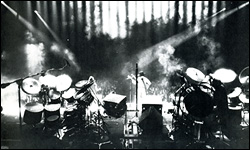 Seconds Out actually shows two things: aesthetic maturity and an exceptional structural coherence for a live album. It is also a pageant of the highpoints of the musically complex era of the band up until 1977. The songs evince a high level of musicianship in most tasteful interpretations. The musicians play so highly attuned to each other that the listener hardly notices the extreme level on which Genesis operate as an ensemble. This is one of the striking differences between Seconds Out and the other two big live albums of 1970s prog: Emerson, Lake & Palmer on Welcome Back My Friends To The Show That Never Ends as well as Yes on Yessongs offered their members a stage to boast their virtuosity. There are no cheap effects, outdated sound games, extravaganzas for their own sake, extreme tempi, excessive solos or exaggerated sentimentalities on Seconds Out. This is why the music on this album seems timeless.
Seconds Out actually shows two things: aesthetic maturity and an exceptional structural coherence for a live album. It is also a pageant of the highpoints of the musically complex era of the band up until 1977. The songs evince a high level of musicianship in most tasteful interpretations. The musicians play so highly attuned to each other that the listener hardly notices the extreme level on which Genesis operate as an ensemble. This is one of the striking differences between Seconds Out and the other two big live albums of 1970s prog: Emerson, Lake & Palmer on Welcome Back My Friends To The Show That Never Ends as well as Yes on Yessongs offered their members a stage to boast their virtuosity. There are no cheap effects, outdated sound games, extravaganzas for their own sake, extreme tempi, excessive solos or exaggerated sentimentalities on Seconds Out. This is why the music on this album seems timeless.
Hence the album is a point of reference not only for 1970s Genesis but for the rock music of that decade that pioneered and expanded the artistic and particularly compositorial options of the genre. Which is why we are tempted to change Murray's words. „Genesis never made a Dark Side Of The Moon, but they made – Seconds Out!“

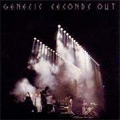


Some say it is one of the best Live-Albums ever. Genesis' Seconds Out became a milestone and also marked the end of the classic years.